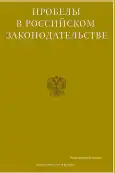On the Influence of Destructive Internet Structures on the Process of Radicalization of Youth: Status, Ways of Counteraction
- 作者: Berova J.M.1, Kanunnikova N.G.1
-
隶属关系:
- North Caucasus Institute for Advanced Studies (branch) of the Krasnodar University of the Ministry of Internal Affairs of Russia
- 期: 卷 15, 编号 3 (2022)
- 页面: 51-55
- 栏目: Articles
- URL: https://journals.rcsi.science/2072-3164/article/view/147474
- ID: 147474
如何引用文章
详细
作者简介
Juliet Berova
North Caucasus Institute for Advanced Studies (branch) of the Krasnodar University of the Ministry of Internal Affairs of Russia
Email: berova-d@yandex.ru
Dr.Sci.(Law), Associate Professor, Deputy Chief Нальчик, КБР, Россия
Natalya Kanunnikova
North Caucasus Institute for Advanced Studies (branch) of the Krasnodar University of the Ministry of Internal Affairs of Russia
Email: natali6977@yandex.ru
Cand.Sci.(Law), Associate Professor, Head of the State and Civil Law Disciplines Department Нальчик, КБР, Россия
参考
- Beshtoev R.O., Kodzokov A.Kh., Dottuev T.I. radicalization of youth. Causes and trends // Education and law. 2021. No. 6. S. 299-303.
- Biktuganova M.Yu. Trends in the development of youth radicalism in organizations of secondary vocational education // Pedagogical education in Russia. 2022. No. 1. S. 43-49.
- Viryaskin M.N. Internet risks for children and adolescents associated with their involvement in destructive activities // Trends in the development of science and education. 2021. No. 73-8. pp. 119-124.
- Grishay E.V. The influence of destructive content in the mass media and the Internet on the radicalization of youth // Effective counteraction to crime in the context of globalization: problems and prospects: materials of the XXV International Scientific and Practical Conference. Krasnodar, 2021. S. 96-101.
- Grishai E.V., Shubakin A.A. Radicalization of youth through the influence of the destructive content of the Internet // Humanitarian, socio-economic and social sciences. 2021. No. 6. S. 24-27.
- Konovalov I.A. Radicalization of Youth: Basic Models and Prevention. Foreign experience // Psychology and pedagogy of service activities. 2021. No. 1. S. 36-42.
- Youth under threat: combating radicalization and extremism on the Internet // Official website of UNESCO. URL: https://ru.unesco.org/news/molodezh-pod-ugrozoy-borba-s-radikalizaciey-i-ekstremizmom-v-internete (Date of access: 04/30/2022).
- Podolny N.A. Factors of youth radicalization and means of preventing its criminalization // Nauka. Society. State. 2021. T 9. No. 2 (34). pp. 72-77.
- Fatkullin D.I. Ways to prevent extremism and radicalism in the electronic environment // I International Forum "Theological Heritage of Muslims in Russia": materials of scientific and practical conferences of the forum. Compiled by: D.M. Abdrakhmanov [i dr.]. Bolgar, 2020. S. 231-233.
- Federal Law No. 489-FZ of December 30, 2020 “On Youth Policy in the Russian Federation” // Collected Legislation of the Russian Federation. 2021. No. 1 (part I). Art. 28.
补充文件








